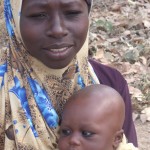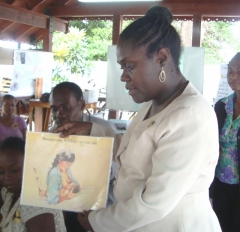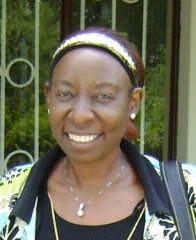New IYCN materials
 Zambia: Qualitative Assessment of Maternal Nutrition Practices
Zambia: Qualitative Assessment of Maternal Nutrition Practices
Kenya: Engaging men to increase support for optimal infant feeding
Lesotho: Infant and young child feeding counseling materials
Success story: Connecting communities with health care facilities to prevent malnutrition in Lesotho
News from our colleagues
PATH: Sweet potato holds promise for reducing malnutrition
Helpful links and publications
World Bank video: Investing in Nutrition: Let’s Grow Together
World Bank publication: Scaling Up Nutrition: What Will It Cost?
Bread for the World brief: New Hope for Malnourished Mothers and Children
Welcome to the fifth issue of the IYCN Update, a newsletter from USAID’s Infant & Young Child Nutrition (IYCN) Project. Distributed four times per year, each issue offers updates on the latest research, new resources, and project news.
Research highlights
How do household rice expenditures impact nutritional status?
In a study published in The Journal of Nutrition in January 2010, researchers used data from the Bangladesh Nutrition Surveillance Project from 2000 to 2005 to explore the relationship between household rice and non-rice expenditures on childhood stunting and maternal underweight. Families who spent more on higher nutritional value non-rice foods were less likely to have stunted children in all age groups. Read more.
Ultra Rice® highly effective in boosting iron stores in young children
Promising new research published in The Journal of Nutrition in January 2010 found that rice fortified with iron-containing. Ultra Rice, developed by PATH, was more effective than iron supplement drops in fighting iron deficiency in children aged 6 to 24 months. Read more.
Continued breastfeeding through two years improves survival of HIV-negative children of HIV-positive moms
In an article published in Clinical Infectious Diseases in February 2010 the authors aim to identify an age at which weaning could safely be recommended to HIV-infected mothers of uninfected infants. Early weaning was associated with a doubled risk of non-HIV-infected mortality, even for mothers receiving support for safer replacement feeding. Read more.
Are multiple RDA multivitamin doses more effective than a single RDA to improve pregnancy outcomes for HIV-positive women?
In a study published in February 2010 in the American Journal of Clinical Nutrition, investigators compared the efficacy of multivitamins at multiple RDA doses and single RDA doses on pregnancy outcomes of HIV-positive women in Tanzania. Analysis showed similar impact from both on all of the studied outcomes. The authors conclude that multiple RDA doses are no more effective, so HIV-infected pregnant women should receive at least a daily single RDA multivitamin. Read more.
Country spotlight: Haiti
Rose Mireille Exumé has hope for Haiti’s mothers and children
Supporting mothers to breastfeed and nourish their children is helping Rose Mireille Exumé, IYCN’s Haiti Country Coordinator, cope with the aftermath of the January 12 earthquake. She finds comfort in knowing that families can improve nutrition for their children despite the adverse conditions they now face.
“I am grateful that I can continue to assist mothers and babies with good nutrition under difficult circumstances. I have hope that we can prevent malnutrition for many children,” said Rose Mireille.
Together with UNICEF and other partners, Rose Mireille is training emergency health workers to provide vital infant feeding counseling for new mothers as they strive to keep their babies healthy after the earthquake.
Learn more about Rose Mireille’s work and read the stories of Solange and Nadine, who have benefited from IYCN’s activities in Haiti.
Update from the field: Zambia
The making of a radio campaign
This month in Zambia, IYCN will launch a radio series promoting good nutrition for infants and young children. IYCN’s behavior change communications specialist, Josephine Nyambe, led development of the series called “Bushes That Grow Are the Future Forest.”
The campaign follows Sister Loveness, a health worker, as she travels around the country to hospitals, mothers’ club meetings, and markets, teaching families about improved infant feeding practices and addressing common barriers to good nutrition.
Read a message from Josephine to learn about her experiences using formative research to design radio scripts, training broadcasters on infant feeding, and producing radio spots.
Conferences
Meet us at the Global Health Council’s Annual Conference
June 14, 2010, 5:30-7:30pm
Join us for Maximizing Nutritional Benefits from Agricultural Interventions, an auxiliary session at the Global Health Council’s 37th Annual International Conference. The project will offer a seminar addressing the interface between agriculture and nutrition, highlighting intervention designs that have the potential either to improve or diminish the nutritional outlook for vulnerable populations. Learn more.
Join us at the XVIII International AIDS Conference
July 18-23, 2010
Planning on attending the upcoming AIDS 2010 conference in Vienna, Austria? Please join the IYCN team for two sessions on infant feeding and HIV. The project will present a poster featuring a literature review of current research on the risks and benefits of infant feeding options for HIV-positive moms and a workshop on how to promote safer breastfeeding within the context of HIV. Learn more.
IYCN presents a program to engage men in infant feeding
IYCN and the AIDS, Population and Health Integrated Assistance (APHIA) II Western Project in Kenya presented a poster at the 5th Breastfeeding and Feminism Symposium on March 20, 2010, in Greensboro, North Carolina. The poster describes a pilot activity that aimed to integrate infant and young child nutrition into community-level male involvement activities in Western Province, Kenya. Learn more.
Download a handout: Engaging men to increase support for optimal infant feeding in Western Kenya
We welcome your feedback and suggestions for our next issue. Please contact: info@iycn.org.
Photos: Aurelio Ayala III, Oluseyi Akintola, Nicole Racine, Kali Erickson
Date: May 19, 2010 | Category: Newsletters


